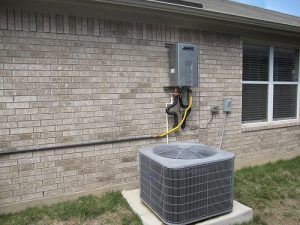Imagine a chilly evening where the only thing standing between you and a warm, relaxing bath is the heat of the water. You might be wondering: can a tankless water heater be installed outside? Let’s dive into this intriguing, yet often overlooked concept of outdoor heating.
Tankless water heaters, renowned for their efficiency and space-saving designs, have garnered popularity in residential settings. The core appeal of these units lies in their ability to provide instantaneous hot water, essentially heating it on demand rather than maintaining a tank full of hot water. However, while many are accustomed to installing these beauties indoors, the question arises: are they equally suitable for outdoor installation?
At the onset, we must embrace the playful challenges posed by outdoor installation. Weather fluctuations, ranging from searing heat to bitter cold, could complicate the performance and lifespan of a tankless water heater. So, what are the factors to consider when contemplating placing one outside?
The primary concern revolves around weather resistance. Most tankless water heaters are designed for indoor use, meaning they may lack insulation or the weatherproofing necessary to handle external elements. If improperly sheltered, these units can become susceptible to temperature extremes, potentially leading to structural damage and impaired functionality. In colder climates, exposed piping risks freezing, rendering the unit inoperative when it’s needed most.
To tackle these challenges, first and foremost, consider the manufacturer’s guidelines. Some brands offer models specifically designed for outdoor use, complete with protective housing and insulation. These outdoor units are crafted to withstand various elements, including rain and snow. Additionally, they often possess enhanced durability against corrosive elements, which is paramount for longevity.
Before installation, contemplate the placement of your tankless water heater. Ideally, it should be sheltered from direct exposure to harsh environmental conditions. Building a protective enclosure, whether a simple shed or a more elaborate structure, ensures that the unit is shielded from rain, wind, and extreme temperatures. Furthermore, this enclosure can facilitate easier access for maintenance purposes, ensuring your heating system runs efficiently year-round.
Consideration of the gas supply is another critical factor. Most tankless water heaters run on natural gas or propane. If your outdoor installation is intended to operate in remote locations away from the main gas line, you will need to assess the best way to supply the heater. A consultation with a professional installer is recommended to navigate these logistics and ensure compliance with local codes and regulations.
Moreover, be mindful of the unit’s venting requirements. Unlike traditional water heaters, tankless systems require venting systems that safely expel exhaust gases. When installed outdoors, the complexity of venting diminishes, as you can use specifically designed ducts. This alleviates the constraints of indoor venting but still necessitates careful planning to prevent potential backdrafts or hazards.
Now, let’s touch on efficiency. While tankless water heaters promise energy savings, those claims may differ when installed outdoors. The efficiency of a tankless system can be influenced by ambient temperatures. In colder climates, the colder incoming water can reduce efficiency, which means the unit may need to work harder to raise water temperatures. This alteration could ultimately affect energy costs and usage. To combat this, selecting a unit with a proper BTU rating for your local climate is essential.
Ultimately, while the prospect of outdoor tankless water heater installation is enticing, weighing the advantages against the challenges is vital. The idea of having an endless supply of hot water without the constraints of internal tank storage is alluring, especially if you frequently entertain outdoors, enjoy outdoor showers, or simply seek a more efficient way of warming water for your hot tub. But first, ensure that you are equipped to tackle the hurdles that outdoor installations present.
In conclusion, the question of whether a tankless water heater can be installed outside hinges on various factors, from climatic conditions to installation intricacies. The growing popularity of outdoor living spaces makes this inquiry especially relevant. With the right model selection, thoughtful placement, and proper installation, enjoying the conveniences of an outdoor tankless water heater could indeed transform your outdoor experience. Whether it’s for sizzling summer showers or warm winter dips, the benefits may very well outweigh the potential challenges—if carefully addressed, of course!
In the dynamic world of home improvement, embracing innovative solutions like outdoor tankless water heaters can elevate your home’s functionality. Do your homework, evaluate your environment, and consult with professionals when necessary. With the right precautions, you might just find that the outdoor tankless water heater is precisely the upgrade your home needs.
